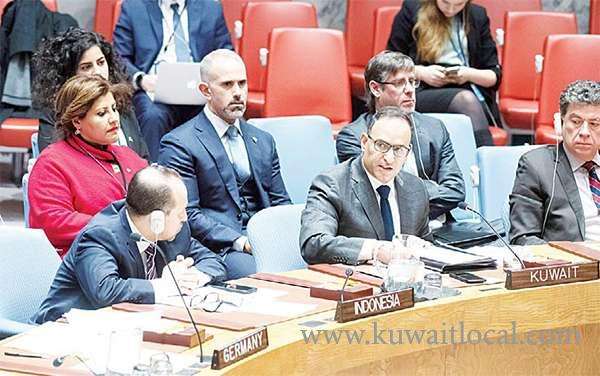Latest News
- Court Sentences Bank Employee To 5 Years For Embezzling 100,000...
- Fake ‘Sheikh’ Sentenced To 2-yr As Court Overturns Verdict
- Justice Ministry New Service On The Sahel App
- Ministry Probes 68 Cases Of Illegal Charity, Funds Collection
- Globally, Kuwait Is Among The Top Consumers Of Incense And Oud O...
- Decrease Seen In Foreign Investment
- Kuwait Customs Seized 2 Containers Laden With Tobacco At Shuwaik...
- Unpaid Salaries, Accountant Beaten Up By Workers
- The Sahel App Was Not Hacked, A Spokesman Claims
- Four Expats Arrested For Stealing Copper Cables Worth 60,000 Din...
- Indian National Died In Abdalli Car Accident
- Work Permits And Foreign Worker Transfers Are Amended By PAM
Kuwait Stresses Role Of Local Bodies In Settling Disputes

Kuwait underlined the important role of regional organizations in settling disputes, particularly when the UN cannot confront such disputes on its own.
Kuwait’s Permanent Representative to the UN Ambassador Mansour Al-Otaibi, made the remarks during a Security Council briefing session by the Organization for Security and Peace in Europe (OSCE).
Al-Otaibi said, “if the United Nations plays an important and fundamental role in the entire cycle of confl icts and in post-confl ict peace and building periods, the support of regional and sub-regional organizations in this process is indispensable.” “Chapter VIII of the UN Charter guides us, and also encourages us to promote such cooperation, but it is also clear that regional and sub-regional organizations are critical cost effective to learn more about the reality of some confl icts,”
Al-Otaibi added. He pointed out that these organizations are the first sensor of the international community and are better able to understand the nature of any conflict, and how to deal with it and respond better. The commitment to continue the annual briefing by OSCE chief since the first meeting in 2004 was a translation and confirmation of the Organization’s commitment to strengthening cooperation with the United Nations, particularly in the area of international peace and security, Al-Otaibi noted.
The ambassador said that OSCE is the largest geographical organization of regional security, which includes the European, Asian and Euro-Asian Mediterranean regions, which adds great value to the common pursuit of international peace and stability and its promotion and effective use in facing the security challenges facing the international community. Al-Otaibi welcomed the first highlevel meeting between the European Union (EU) and OSCE last December and the agreement between the two organizations to formalize their relationship through high-level annual meetings. Al-Otaibi added that the European continent is witnessing some prolonged confl icts that require radical solutions, for example the confl icts in Nagorno- Karabakh, Georgia, Kosovo, Bosnia- Herzegovina, Cyprus and Moldova.
OSCE traces its origins to the detente phase of the early 1970s, when the Conference on Security and Co-operation in Europe (CSCE) was created to serve as a multilateral forum for dialogue and negotiation between East and West. Meeting over two years in Helsinki and Geneva, the CSCE reached agreement on the Helsinki Final Act, which was signed on August 1, 1975. Meanwhile, Kuwait expressed joy over the development in the South Sudan peace deal, hoping all sides would complete the pre-transitional stage before May.
The remarks were made by Kuwait’s Permanent Representative to the UN Ambassador Mansour Al-Otaibi during the UN Security Council’s (UNSC) session late Friday. Al-Otaibi welcomed the return of confl icting leaders to the capital Juba, hoping that other parties would also join in the peace deal. In another development, he called for allowing women to take part in executing the deal and play a role in ending the confl ict.
Although the security condition in Juba is improving, the UN mission must exert more efforts to protect civilians and boost the political process, he noted. Al-Otaibi also thanked South Sudan’s neighboring countries, especially the Intergovernmental Authority on Development (IGAD) member-countries for supporting the peace process. Moreover, the Ambassador called for a safe return of refugees and displaced citizens to their homes on the country.
Trending News
-
 Eid Al Fitr 2024: Crescent Moon Not Sighted In Sau...
08 April 2024
Eid Al Fitr 2024: Crescent Moon Not Sighted In Sau...
08 April 2024 -
 Kuwait Implements Home Biometrics Services Ahead O...
14 April 2024
Kuwait Implements Home Biometrics Services Ahead O...
14 April 2024 -
 When Will Eid Al Fitr 2024 Take Place In Qatar, Ba...
08 April 2024
When Will Eid Al Fitr 2024 Take Place In Qatar, Ba...
08 April 2024 -
 On Sunday, The Meteorological Department Warns Of...
07 April 2024
On Sunday, The Meteorological Department Warns Of...
07 April 2024 -
 Kuwait Airways Provides Update On Flight Schedule...
14 April 2024
Kuwait Airways Provides Update On Flight Schedule...
14 April 2024 -
 Kuwait Airways Introduces Convenient Home Luggage...
15 April 2024
Kuwait Airways Introduces Convenient Home Luggage...
15 April 2024 -
 Gathering For Eid Al-Fitr Prayers: Kuwaiti Citizen...
10 April 2024
Gathering For Eid Al-Fitr Prayers: Kuwaiti Citizen...
10 April 2024 -
 Winners Of Kuwait National Assembly 2024 Elections
06 April 2024
Winners Of Kuwait National Assembly 2024 Elections
06 April 2024 -
 An Egyptian Expat Dies At Kuwait's Airport
11 April 2024
An Egyptian Expat Dies At Kuwait's Airport
11 April 2024 -
 Bay Zero Water Park Kuwait: Summer Season Opens Ei...
11 April 2024
Bay Zero Water Park Kuwait: Summer Season Opens Ei...
11 April 2024












Comments Post Comment